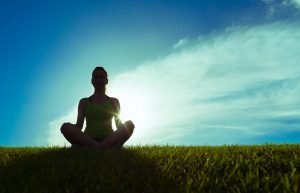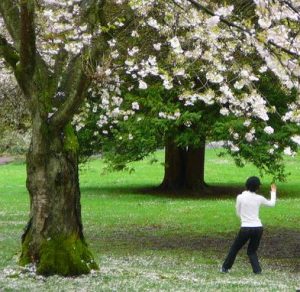If you are someone who suffers from anxiety, you’ll know how unpleasant it can be. You may find yourself constantly worried or irrationally scared by certain things, and this can start to interfere with your day to day life.
Thankfully there are lots of techniques that you can use to help control the symptoms and underlying causes of anxiety, including exercise, cognitive behavior therapy and meditation.
In recent years, mindfulness exercises for anxiety have proven to be very popular.
In this article we’ll explore a few themes around anxiety and how mindfulness meditation can help including:
- Coping mechanisms for dealing with anxiety
- Mindfulness meditation
- Specific mindfulness exercises for anxiety
- Where to look for further reading
Continue reading through, or use the navigation below to jump to the relevant section.
Dealing with anxiety
Anxiety is a continuous battle; that heaviness on your mind where things don’t feel quite right, but pinpointing what that is can be the hardest part. The feeling of butterflies in your stomach, that aren’t pleasant, the tight knot that you are unable to untwist; anxiety makes you overthink and over analyze everything, no matter how relevant or irrelevant it may be.
The change from feeling completely empty and dissociated with society, to the voice in the back of your heard telling you that things are not okay, that something is wrong with you, but you don’t know what.
Some of the struggles people dealing with anxiety experience are:
- Panic attacks – Simply driving your car to work, eating in a restaurant, or sleeping can cause panic attacks for those with anxiety. Suddenly your heart rate increases, your stomach feels sick, and that thing you mulled over the other day, or even the other week, hits you like a ton of bricks and drives you into a panic attack.
- The ‘need to know’ – For those struggling and dealing with anxiety, one of the worst phrases that can be said to you is “I’ll talk to you later”. What does this mean? Have I done something wrong? The need to know is excruciating; the mind gets on the rollercoaster and doesn’t come off until that need has been satisfied.
Thankfully there are a number of relaxation techniques for anxiety that can make life much easier for sufferers, and in particular practicing mindfulness has been shown to be effective.
What is mindfulness meditation?

Mindfulness exercises for anxiety can help to control symptoms
Bringing awareness to our senses, thoughts and emotions, is being mindful. Being truly in the moment; aware of what we’re doing and where we are, but not reacting to anything around us.
Mindfulness meditation is something we all naturally possess but can often not be readily available unless we practice on a daily basis.
The key benefits of being mindful are:
- Lowering stress – It is known that stress can make you unwell, in many different ways. Mindfulness has shown to reduce and decrease stress caused by major events, or everyday life.
- Focusing the mind – With a million and one things going on, we can often lose focus. Mediation allows us to gain an increased ability to relax and focus.
- Improving mental health – By helping people to focus on and accept their experiences and emotions, mindfulness can help to alleviate symptoms of depression, relationship conflicts, OCD, and anxiety
Mindfulness Therapy
Mindfulness therapy is being used to treat many conditions like stress, anxiety and depression.
Practicing mindfulness meditation introduces people to focus on being aware of their thoughts and feelings; accepting that they are there, but not reacting to them. Mindfulness exercises for anxiety have helped many people to reduce their symptoms by disengaging from negative thought patterns.
Mindfulness Exercises for Anxiety
Mindfulness meditation exercises are a proven method of reducing peoples’ symptoms of anxiety, many of which can be practiced at home.
- Meditation techniques for anxiety – Meditation is really about training the mind and body to relax. One of the main aspects to meditation is to sit quietly, comfortably, and focus on your breathing in an effortless manner. Quieting the mind forms the ability to self-observe, and focus your attention on one thing at a time. Reducing the number of thoughts racing through your mind will allow you to accomplish more, stopping your mind from wandering onto different topics.
- Body Scan Mindfulness – Body scan enables you to become more aware of the different regions of your body; it trains your mind to move from detailed attention on a particular area/subject, to a more spacious awareness. Letting go of feelings and unwanted emotions, in addition to train your minds attention, by focusing your attention to the top of your body, and moving slowly down, over a relaxing period of time.
- Jon Kabat Zinn mindfulness training – Jon’s mindfulness training focuses on mindfulness-based stress reduction (MBSR), reducing stress, increasing relaxation, and how to apply mindfulness meditation into our everyday lives. He teaches how to increase and utilize our capacity to face stress, pain, and illness, through a series of techniques and teachings.
- Mindfulness worksheets – Mindfulness is most often and best described as a ‘way of being’, however, this doesn’t mean that we can’t learn techniques to support us in doing so. Mindfulness worksheets can be a good tool to understanding what mindfulness is, and how to introduce it into our everyday lives, as a way of being and living.
There are also several methods from Far Eastern culture that can help to address anxiety.

Tai Chi basics
- Qi Gong breathing – Qigong is a traditional Chinese practice that includes various postures and breathing techniques. Several research studies have shown Qigong to have “a positive medical benefit on people with generalized anxiety disorders”.
- Tai Chi – For centuries Tai Chi has been practiced across East Asia as an excellent relaxation technique. The Mayo Clinic has specifically identified Tai Chi as an effective way of fighting stress and anxiety.
Keeping on top of anxiety and not allowing it to take over your life can be a struggle, however, there are many exercises and techniques that can be taught and performed in order to make everyday life easier to get through, and ultimately, enjoyable.
Fun mindfulness exercises
Practicing these daily mindfulness exercises will help you to keep on top of your anxiety, whilst introducing a little fun.
- Squish and relax mediation – Effective, yet fun, lay down with your eyes closed, then squeeze every muscle in your body as tightly as possible, from head to toe, hands to feet. Once you’ve squished every muscle, hold in position for a few seconds, then release and relax. Loosening up the body and mind whilst not really focusing on doing so is a fun activity that will help to make you more aware of what you are holding onto.
- Roaring in the wind – It may sound and feel silly at first thought, but this exercise is a brilliant way to let go of any pent up feelings or emotions. Once you’ve had your first experience, you’ll realize just how fun it can be. Go out into the garden on a windy day, or head down to the beach, stretch your arms out wide and let rip a primal roar. Feel the wind on your skin and fall to the ground; laugh, cry, smile, or say nothing. Let loose and feel exhilarated with this fun exercise which can be enjoyed individually, with your children, or as a group.
Anxiety and Weight Gain

Anxiety can lead to weight gain for some people
Anxiety affects people in different ways, and as a result it can lead to weight gain for some people.
You may genuinely be feeling hungrier due to hormonal imbalances or your may simply turn to comfort food and overeating as a coping mechanism. Either way, the excess calories can result in you putting on extra pounds if you are not careful.
Practicing a healthy low calorie diet can help you control your weight, which may in turn help you to feel better.
Another factor with anxiety is that it can make you less inclined to exercise. Inactivity means that you are burning fewer calories which can also lead to weight gain.
Try to make time each day to exercise, or even just take a long walk. Not only will this help you burn some extra calories, but it is a great stress reliever as well. All of this will help to keep you motivated to lose weight.
Best Meditation books for anxiety
For further reading, there are many popular and relevant books on mindfulness and meditation, including:
- Meditation: Meditation for Beginners – How to Relieve Stress, Anxiety and Depression and Return to a State of Inner Peace and Happiness (How to Meditate, … for Beginners, Mindfulness Book 1)
– A beginners guide to meditation, learning the benefits and implementing meditation practice into a daily routine.
- MINDFULNESS: Simple Techniques You Need to Know to Live in The Moment and Relieve Stress, Anxiety and Depression for Good: (STRESS-FREE, MEDITATION, HAPPINESS, … PEACE) (Mindfulness Book Series Book 1)
– An informative book about mindfulness, including practicing techniques that are easy to introduce into your daily life.
- Mindfulness Meditation: Your Guide To Achieving A Life of Peace By Reducing Stress and Anxiety Through Mindfulness Meditation
– Simple and effective step-by-step exercises and techniques that are easy to practice, introducing deep relaxation, and how to deal with anxiety and reduce stress.
Mindfulness at work
America is one of the most anxious nations in the world, and workplace culture is a big factor in this.
More and more people are showing signs of anxiety disorders and this can have a real impact on your productivity and performance.
The last thing you want to do is feel stressed at work; there’s enough going on in everyday life.
Gain the upper hand on stress and anxiety by taking a few moments out of your working day to practice mindfulness at work, making your days more productive.
Start practicing today
If you are interested in mindfulness and anxiety is something that is negatively impacting your life, it is certainly worth exploring further how you can build these types of relaxation techniques into your daily life.
Mindfulness exercises will help to keep you calm when anxiety starts to creep up on you, and if you practice mindfulness regularly it may help to prevent these attacks occurring altogether.


